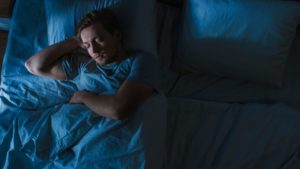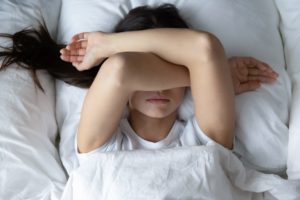When you buy through our links, we may earn a commission. Products or services may be offered by an affiliated entity. Learn more.
Nocturnal Panic Attack
- Nocturnal panic attacks are sudden episodes of intense fear that typically occur during non-REM sleep.
- Nocturnal panic attacks can cause anxiety, rapid heart rate, sweating, trembling, shortness of breath, and chest pain.
- Triggers can vary but may include stress, traumatic events, or changes in sleep patterns.
- Treatment options include therapy, relaxation techniques, medication, and self-care.
A panic attack is a sudden onset of fear accompanied by physical symptoms such as sweating, a racing heart, or a sensation of not being able to breathe. Panic attacks that arise during a period of sleep are called nocturnal panic attacks.
Nighttime panic attacks can make it difficult to fall back asleep. When nocturnal panic attacks occur over and over again over time, a person may even become afraid to go to sleep. Research suggests that people who experience nocturnal panic attacks are more likely to get insufficient sleep.
Looking to improve your sleep? Try upgrading your mattress.
What Are Nocturnal Panic Attacks?
During a nocturnal panic attack, the sleeper wakes up feeling terrified. They may fear that something awful is about to happen, or they may believe they are dying or having a heart attack . Panic attacks usually become most intense within a few minutes, but they may last up to an hour.
Nocturnal panic attacks typically happen during brief awakenings while a sleeper is transitioning between light sleep and deep sleep. They are more common in the first half of the night.
Panic attacks at any time of day can occur with no apparent cause, or they may have a specific trigger . Nocturnal panic attacks sometimes occur right after a bad dream, but they often happen for no identifiable reason.
Panic attacks in sleep are common in people with panic disorder, a mental health condition involving frequent panic attacks and enduring feelings of fear. Rarely, a person may have predominantly nocturnal attacks as opposed to daytime panic attacks.
“It is important to distinguish panic attacks from nocturnal panic attacks as this may help with narrowing down the list of probable causes. This in turn helps with finding out the right treatment sooner.”
Dr. Abhinav Singh, Sleep Physician
Nocturnal Panic Attack Symptoms
Nocturnal panic attacks resemble daytime panic attacks and can cause nausea, sweating, altered breathing, and a pounding heart beat. These sensations occur during an awakening from sleep and are often accompanied by intense fear or a sense of losing control.
Experts have established 13 symptoms of a panic attack. To qualify as a panic attack, a person must experience at least four of these 13 symptoms:
- Fear of going insane or losing control
- Fear that death is imminent
- Feeling unreal or detached from the body
- Racing heart rate
- Trembling
- Sweating
- Feeling smothered or short of breath
- Nausea or upset stomach
- Dizziness or lightheadedness
- Sensations of choking
- Feeling very hot or cold
- Tingling or numbness
- Chest pain
Though more research is needed to better differentiate symptoms of nocturnal and daytime panic attacks, nocturnal episodes may be more likely to involve feelings of choking.
Nocturnal Panic Attacks vs. Night Terrors
Though they share some symptoms, nocturnal panic attacks are not the same as night terrors. Nocturnal panic attacks involve a sleeper clearly waking up. In contrast, someone experiencing a night terror is not fully awake or conscious even though they may start screaming, open their eyes, sit up, or appear very frightened.
Because they are awakened during nocturnal panic attacks, people typically remember the episodes, which may lead to a fear of sleep. With night terrors, though, there is usually no memory of the episode in the morning.
Both night terrors and nocturnal panic attacks cause physical manifestations of panic such as a pounding heart, sweating, or fast breathing. However, while the sleeper might flail around or even jump out of bed during a night terror, this type of movement is not usually seen during a nocturnal panic attack.
Night terrors occur most often in children under the age of 5 and become gradually less common with age. By contrast, nocturnal panic attacks can occur during childhood or adulthood, and they frequently accompany stress or anxiety disorders.
What Causes Night Time Panic Attacks?
It is often difficult to pinpoint any immediate cause of a nocturnal panic attack. However, a number of factors may make it more likely for someone to experience a panic attack. Genes, brain chemistry, childhood experiences, and personality traits such as high anxiety may make certain people more likely to have panic attacks. Stressful situations, such as the loss of a loved one, relationship problems, traumatic events, or anxieties related to work or school, may then act as a trigger for panic attacks in these individuals.
Some researchers believe nighttime panic attacks happen when people feel vulnerable and anxious at bedtime, worrying that sleep will reduce their ability to respond to a threat . Supporting this idea, experts have observed that people who experience nocturnal panic attacks often keep the lights on at night or put off going to sleep as long as possible. However, more research is needed to validate this theory of nocturnal panic attacks.
Panic attacks can also commonly occur in people who have other medical and mental health conditions. Nighttime panic attacks may also be linked to certain sleep disorders.
- Panic disorder: Panic disorder is a condition that involves repeated panic attacks that induce lasting anxiety or unhealthy behavior designed to prevent future episodes. As many as 71% of people with panic disorder will have at least one nocturnal panic attack, and 18% to 45% of people with panic disorder have recurring nighttime episodes . Just 2% of people with panic disorder have attacks primarily at night.
- Anxiety and mood disorders: Anxiety and sleep share a complicated relationship. A number of anxiety disorders can be linked to panic attacks, including generalized anxiety disorder, social anxiety disorder, and agoraphobia, which is a fear of certain situations like being in a crowded place. Depression and bipolar disorder have also been associated with panic attacks.
- Substance use: People with substance use disorders may be more likely to experience panic attacks. Stopping certain medications or drugs of abuse can trigger panic attacks, and so can consuming too much caffeine or nicotine. People with panic disorder who try to use alcohol or sedatives to relax typically see their symptoms worsen over time even if these drugs provide some short-term relief.
- Obstructive sleep apnea: People with obstructive sleep apnea have repeated reductions in breathing during sleep that cause brief awakenings, and research suggests that people with sleep apnea may be more likely to develop panic disorder . Obstructive sleep apnea can cause sensations of suffocating or choking, which may provoke anxiety, and reduced oxygen levels during sleep may contribute to an elevated risk of panic disorder.
- Post-traumatic stress disorder: Post-traumatic stress disorder (PTSD) is characterized by lasting health effects after a traumatic event or situation. People with PTSD may experience trouble sleeping, nightmares involving the traumatic event, and panic attacks during the day and at night.
- Medical conditions: Many health conditions, including asthma, chronic pain, and cardiovascular disease, are correlated with panic attacks.Some medical conditions cause symptoms that resemble anxiety, such as a reddened face or irregular heartbeat, and these symptoms have the potential to trigger a panic attack.
Treatment for Nocturnal Panic Attacks
Panic attacks at night tend to happen without warning, but there are several ways to ease symptoms when they occur.
- Identify the panic attack: It is easy to become preoccupied by worries and negative thoughts during a panic attack. It may help to try to remember that a panic attack is not dangerous in and of itself and that panic-driven symptoms do not represent a medical emergency.
- Use breathing techniques: Breathing plays a key role in many panic attacks, as panicky breathing may worsen dizziness and other symptoms. Try using slow, deep breathing to get through an episode. Experts are also developing more precise techniques to help people understand their breathing patterns and how they relate to panic attack symptoms.
- Try other relaxation techniques: Learning to relax is a key step in coming down from a panic attack. One relaxation technique that might help is progressive muscle relaxation, which involves gradually engaging and disengaging muscle groups throughout the body.
How to Prevent Nocturnal Panic Attacks
Doctors usually prescribe cognitive behavioral therapy, medication, or both to treat nocturnal panic attacks. While panic attacks may never completely go away, removing stressors and using other treatment methods may help reduce panic attacks .
- Cognitive behavioral therapy:, Cognitive behavioral therapy (CBT) is based on the idea that a person can change how they respond to different situations. CBT teaches coping skills, methods of countering nighttime anxiety, and techniques to recognize when symptoms are triggered by anxiety and not by a medical emergency.
- Medication: Antidepressants called selective serotonin reuptake inhibitors (SSRIs) are commonly used for nocturnal panic attacks. On a case-by-case basis, doctors may also consider other antidepressants or certain sedatives.
- Treating underlying conditions: When panic attacks are related to other medical or mental health conditions, a treatment plan may involve addressing these issues as well. One small study found that treating obstructive sleep apnea with continuous positive airway (CPAP) therapy was able to reduce panic attacks.
- Practice self-care: Experts recommend eating well, exercising regularly, prioritizing sleep, and reaching out to loved ones for support to try to prevent and cope with anxiety and panic attacks.
Treatments for nocturnal panic attacks are tailored to the individual, so it is important to consult with a doctor who can discuss the benefits and drawbacks of each treatment option in that specific situation.
When to Talk To Your Doctor
You should tell your doctor if you think you are experiencing panic attacks, whether during the day or at night. Proper treatment can help reduce the impact of panic attacks , which can take a toll on your sleep and quality of life.
Panic attacks may involve symptoms such as dizziness, chest pain, or stomach pain. When these symptoms occur solely as part of a panic attack, they do not represent a medical problem. However, doctors may need to rule out the possibility that you have another health condition. To reach the proper diagnosis, they may ask about:
- Other times that you have experienced chest pain or a rapid heartbeat
- Whether you smoke or have asthma
- Unexplained weight loss
- Irritability or restlessness
- Migraines, headaches, or seizures
- Balance problems
- Recent changes to your medications
- Energy levels and mood
- Sources of stress or trauma
- Specific fears, such as a fear of crowds
- Substance use
- If anyone else in your family has anxiety disorders
Your health history can help the doctor understand the most likely causes of your symptoms, which is a critical step toward identifying a treatment plan that can offer relief for panic attacks.

Still have questions? Ask our community!
Join our Sleep Care Community — a trusted hub of sleep health professionals, product specialists, and people just like you. Whether you need expert sleep advice for your insomnia or you’re searching for the perfect mattress, we’ve got you covered. Get personalized guidance from the experts who know sleep best.
References
10 Sources
-
Zak, R. & Karippot, A. (2022, November 4). Nightmares and nightmare disorder in adults. In A. Y. Avidan (Ed.). UpToDate.
https://www.uptodate.com/contents/nightmares-and-nightmare-disorder-in-adults -
Roy-Byrne, P. P. (2023 April). Panic disorder in adults: Epidemiology, clinical manifestations, and diagnosis. In M. B. Stein (Ed.). UpToDate.
https://www.uptodate.com/contents/panic-disorder-in-adults-epidemiology-clinical-manifestations-and-diagnosis -
Nakamura, M., Sugiura, T., Nishida, S., Komada, Y., & Inoue, Y. (2013). Is nocturnal panic a distinct disease category? Comparison of clinical characteristics among patients with primary nocturnal panic, daytime panic, and coexistence of nocturnal and daytime panic. Journal of Clinical Sleep Medicine, 9(5), 461–467.
https://pubmed.ncbi.nlm.nih.gov/23674937/ -
Smith, N. S., Albanese, B. J., Schmidt, N. B., & Capron, D. W. (2019). Intolerance of uncertainty and responsibility for harm predict nocturnal panic attacks. Psychiatry Research, 273, 82–88.
https://pubmed.ncbi.nlm.nih.gov/30640055/ -
Foldvary-Schaefer, N. (2023 April). Disorders of arousal from non-rapid eye movement sleep in adults. In A. Y. Avidan (Ed.). UpToDate.
https://www.uptodate.com/contents/disorders-of-arousal-from-non-rapid-eye-movement-sleep-in-adults -
Su, V. Y., Chen, Y. T., Lin, W. C., Wu, L. A., Chang, S. C., Perng, D. W., Su, W. J., Chen, Y. M., Chen, T. J., Lee, Y. C., & Chou, K. T. (2015). Sleep Apnea and Risk of Panic Disorder. Annals of family medicine, 13(4), 325–330.
https://pubmed.ncbi.nlm.nih.gov/26195676/ -
Barnhill, J. W. (2020, April). Panic attacks and panic disorder. Merck Manual Professional Version.
https://www.merckmanuals.com/home/mental-health-disorders/anxiety-and-stress-related-disorders/panic-attacks-and-panic-disorder -
Craske, M. (2023, April). Psychotherapy for panic disorder with or without agoraphobia in adults. In M. B. Stein (Ed.). UpToDate.
https://www.uptodate.com/contents/psychotherapy-for-panic-disorder-with-or-without-agoraphobia-in-adults -
Carlson, A. M., Young, J., & Avidan, A. (2016). Frightening spells at night. Journal of Clinical Sleep Medicine, 12(6), 925–927.
https://pubmed.ncbi.nlm.nih.gov/27092704/ -
National Institute of Mental Health. (n.d.). Panic disorder: When fear overwhelms.
https://www.nimh.nih.gov/health/publications/panic-disorder-when-fear-overwhelms











